Interpretation of Modern Ideologies in Hamlet
VerifiedAdded on 2022/08/20
|5
|1230
|22
AI Summary
Contribute Materials
Your contribution can guide someone’s learning journey. Share your
documents today.
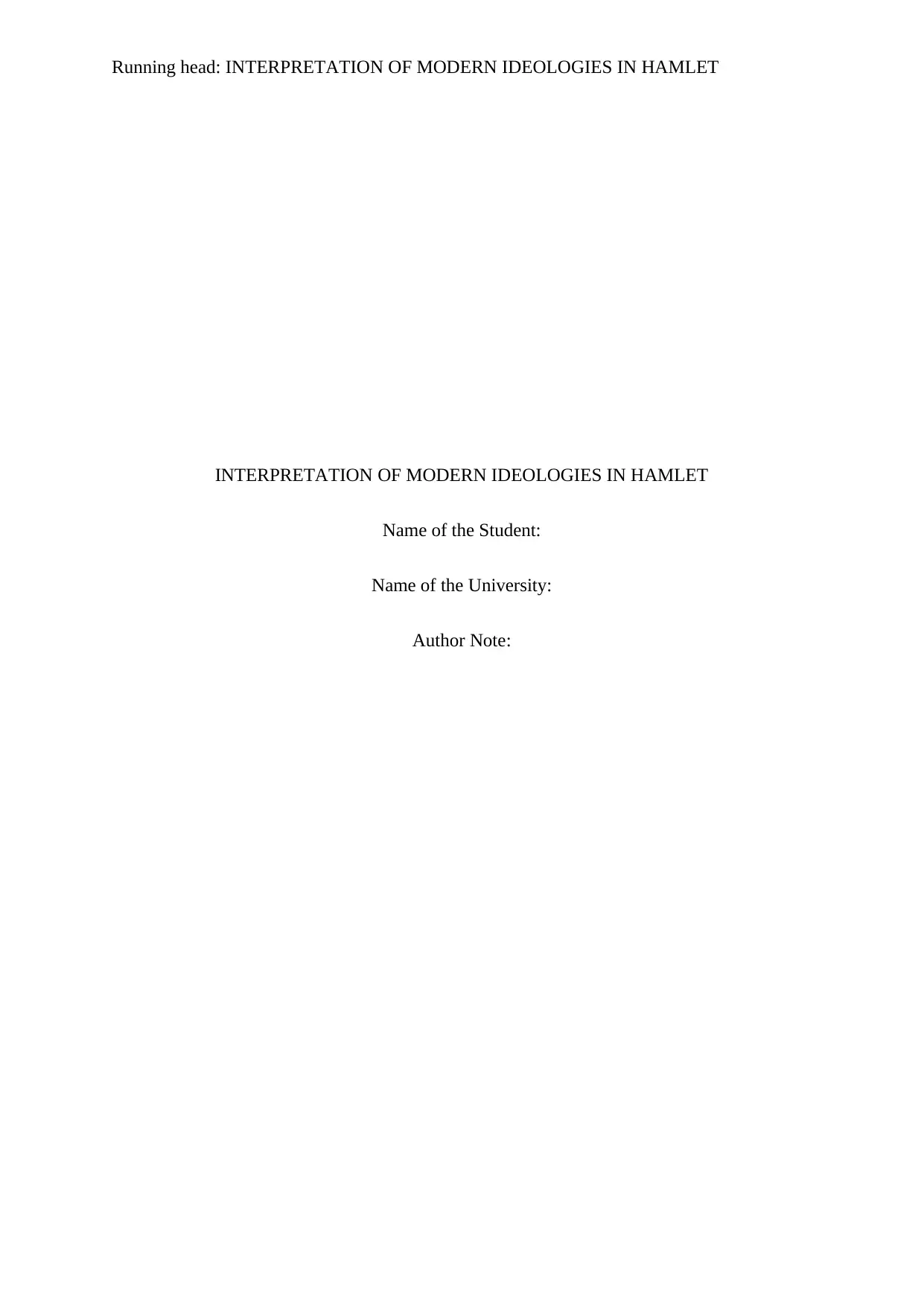
Running head: INTERPRETATION OF MODERN IDEOLOGIES IN HAMLET
INTERPRETATION OF MODERN IDEOLOGIES IN HAMLET
Name of the Student:
Name of the University:
Author Note:
INTERPRETATION OF MODERN IDEOLOGIES IN HAMLET
Name of the Student:
Name of the University:
Author Note:
Secure Best Marks with AI Grader
Need help grading? Try our AI Grader for instant feedback on your assignments.
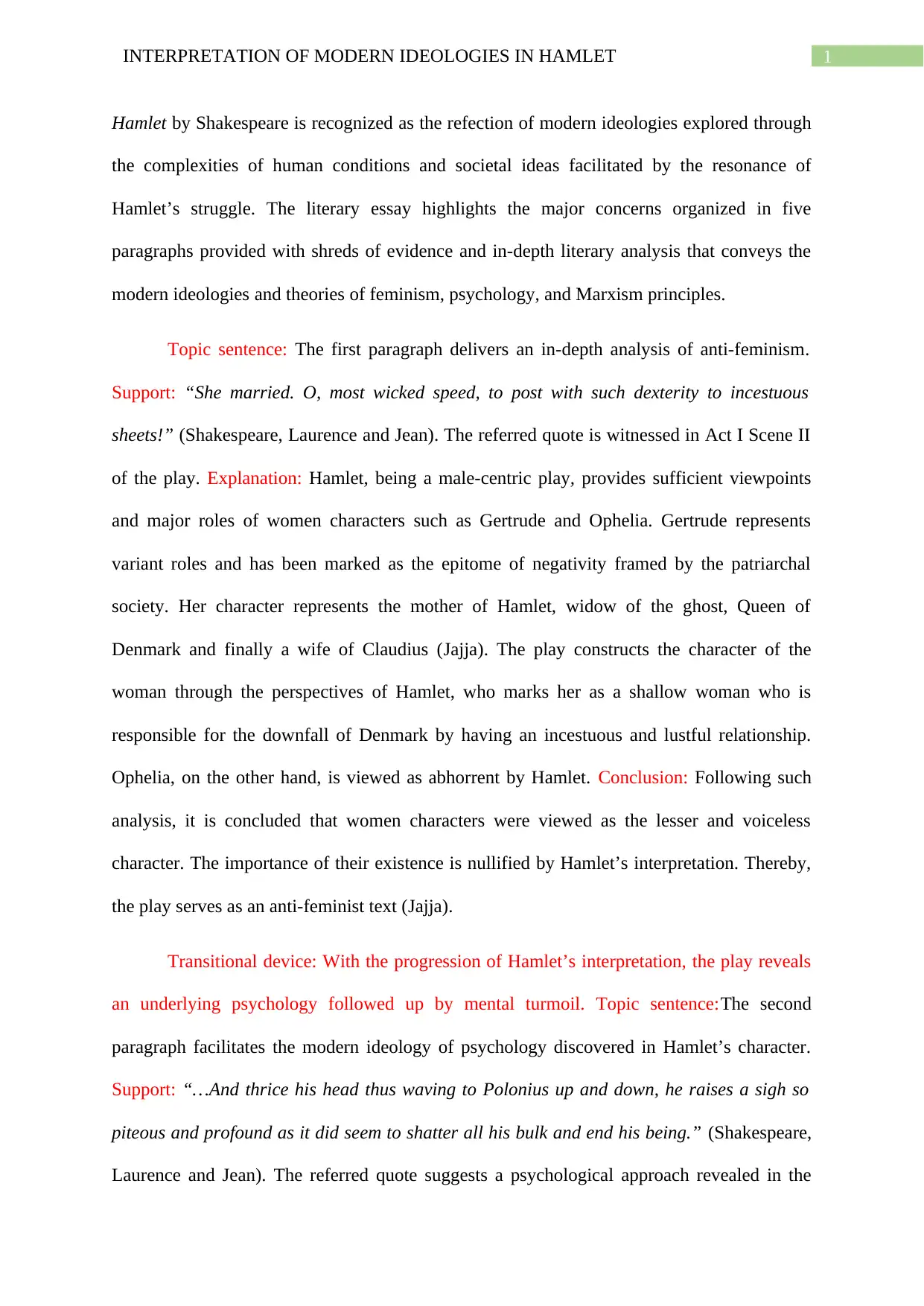
1INTERPRETATION OF MODERN IDEOLOGIES IN HAMLET
Hamlet by Shakespeare is recognized as the refection of modern ideologies explored through
the complexities of human conditions and societal ideas facilitated by the resonance of
Hamlet’s struggle. The literary essay highlights the major concerns organized in five
paragraphs provided with shreds of evidence and in-depth literary analysis that conveys the
modern ideologies and theories of feminism, psychology, and Marxism principles.
Topic sentence: The first paragraph delivers an in-depth analysis of anti-feminism.
Support: “She married. O, most wicked speed, to post with such dexterity to incestuous
sheets!” (Shakespeare, Laurence and Jean). The referred quote is witnessed in Act I Scene II
of the play. Explanation: Hamlet, being a male-centric play, provides sufficient viewpoints
and major roles of women characters such as Gertrude and Ophelia. Gertrude represents
variant roles and has been marked as the epitome of negativity framed by the patriarchal
society. Her character represents the mother of Hamlet, widow of the ghost, Queen of
Denmark and finally a wife of Claudius (Jajja). The play constructs the character of the
woman through the perspectives of Hamlet, who marks her as a shallow woman who is
responsible for the downfall of Denmark by having an incestuous and lustful relationship.
Ophelia, on the other hand, is viewed as abhorrent by Hamlet. Conclusion: Following such
analysis, it is concluded that women characters were viewed as the lesser and voiceless
character. The importance of their existence is nullified by Hamlet’s interpretation. Thereby,
the play serves as an anti-feminist text (Jajja).
Transitional device: With the progression of Hamlet’s interpretation, the play reveals
an underlying psychology followed up by mental turmoil. Topic sentence:The second
paragraph facilitates the modern ideology of psychology discovered in Hamlet’s character.
Support: “…And thrice his head thus waving to Polonius up and down, he raises a sigh so
piteous and profound as it did seem to shatter all his bulk and end his being.” (Shakespeare,
Laurence and Jean). The referred quote suggests a psychological approach revealed in the
Hamlet by Shakespeare is recognized as the refection of modern ideologies explored through
the complexities of human conditions and societal ideas facilitated by the resonance of
Hamlet’s struggle. The literary essay highlights the major concerns organized in five
paragraphs provided with shreds of evidence and in-depth literary analysis that conveys the
modern ideologies and theories of feminism, psychology, and Marxism principles.
Topic sentence: The first paragraph delivers an in-depth analysis of anti-feminism.
Support: “She married. O, most wicked speed, to post with such dexterity to incestuous
sheets!” (Shakespeare, Laurence and Jean). The referred quote is witnessed in Act I Scene II
of the play. Explanation: Hamlet, being a male-centric play, provides sufficient viewpoints
and major roles of women characters such as Gertrude and Ophelia. Gertrude represents
variant roles and has been marked as the epitome of negativity framed by the patriarchal
society. Her character represents the mother of Hamlet, widow of the ghost, Queen of
Denmark and finally a wife of Claudius (Jajja). The play constructs the character of the
woman through the perspectives of Hamlet, who marks her as a shallow woman who is
responsible for the downfall of Denmark by having an incestuous and lustful relationship.
Ophelia, on the other hand, is viewed as abhorrent by Hamlet. Conclusion: Following such
analysis, it is concluded that women characters were viewed as the lesser and voiceless
character. The importance of their existence is nullified by Hamlet’s interpretation. Thereby,
the play serves as an anti-feminist text (Jajja).
Transitional device: With the progression of Hamlet’s interpretation, the play reveals
an underlying psychology followed up by mental turmoil. Topic sentence:The second
paragraph facilitates the modern ideology of psychology discovered in Hamlet’s character.
Support: “…And thrice his head thus waving to Polonius up and down, he raises a sigh so
piteous and profound as it did seem to shatter all his bulk and end his being.” (Shakespeare,
Laurence and Jean). The referred quote suggests a psychological approach revealed in the
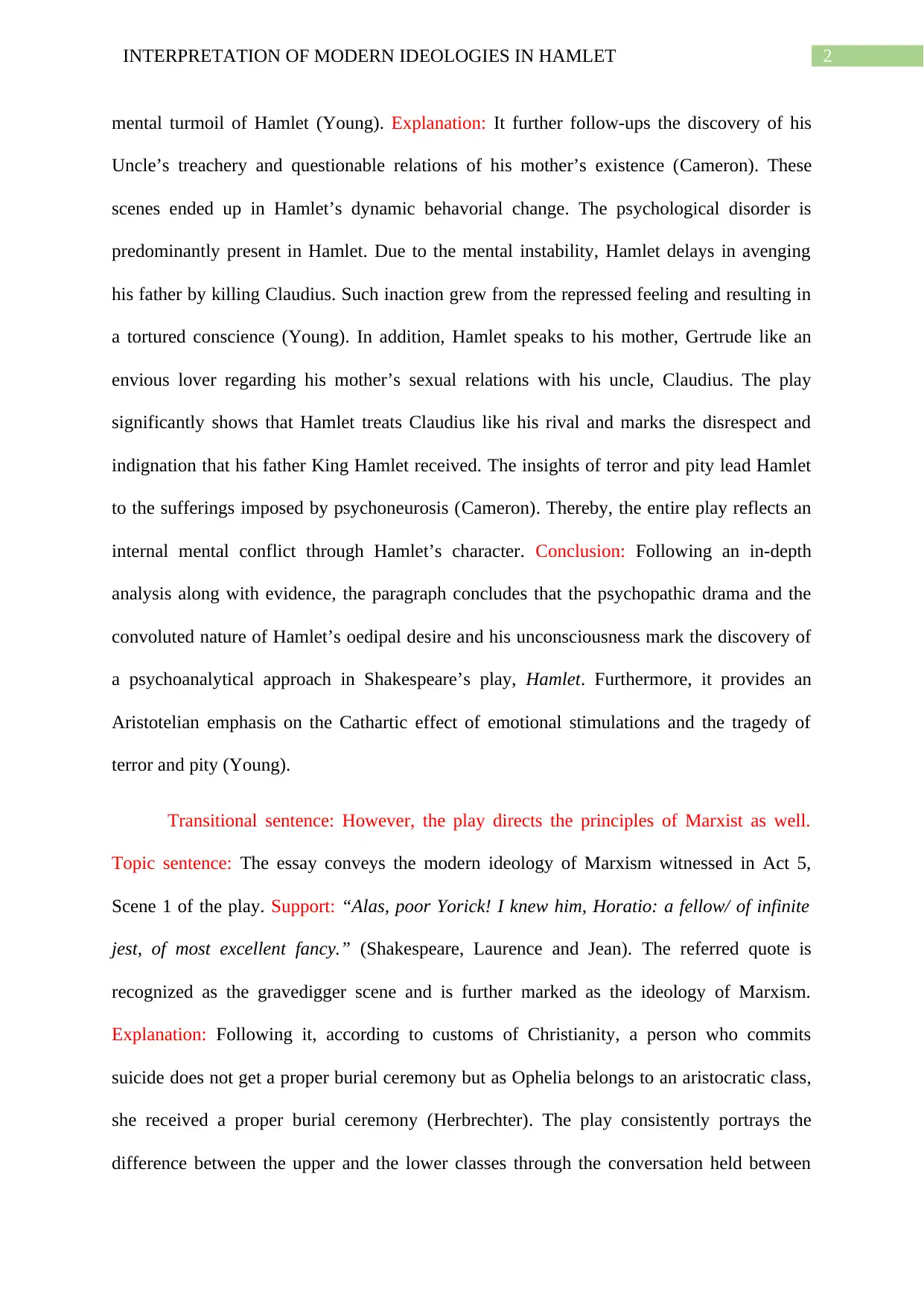
2INTERPRETATION OF MODERN IDEOLOGIES IN HAMLET
mental turmoil of Hamlet (Young). Explanation: It further follow-ups the discovery of his
Uncle’s treachery and questionable relations of his mother’s existence (Cameron). These
scenes ended up in Hamlet’s dynamic behavorial change. The psychological disorder is
predominantly present in Hamlet. Due to the mental instability, Hamlet delays in avenging
his father by killing Claudius. Such inaction grew from the repressed feeling and resulting in
a tortured conscience (Young). In addition, Hamlet speaks to his mother, Gertrude like an
envious lover regarding his mother’s sexual relations with his uncle, Claudius. The play
significantly shows that Hamlet treats Claudius like his rival and marks the disrespect and
indignation that his father King Hamlet received. The insights of terror and pity lead Hamlet
to the sufferings imposed by psychoneurosis (Cameron). Thereby, the entire play reflects an
internal mental conflict through Hamlet’s character. Conclusion: Following an in-depth
analysis along with evidence, the paragraph concludes that the psychopathic drama and the
convoluted nature of Hamlet’s oedipal desire and his unconsciousness mark the discovery of
a psychoanalytical approach in Shakespeare’s play, Hamlet. Furthermore, it provides an
Aristotelian emphasis on the Cathartic effect of emotional stimulations and the tragedy of
terror and pity (Young).
Transitional sentence: However, the play directs the principles of Marxist as well.
Topic sentence: The essay conveys the modern ideology of Marxism witnessed in Act 5,
Scene 1 of the play. Support: “Alas, poor Yorick! I knew him, Horatio: a fellow/ of infinite
jest, of most excellent fancy.” (Shakespeare, Laurence and Jean). The referred quote is
recognized as the gravedigger scene and is further marked as the ideology of Marxism.
Explanation: Following it, according to customs of Christianity, a person who commits
suicide does not get a proper burial ceremony but as Ophelia belongs to an aristocratic class,
she received a proper burial ceremony (Herbrechter). The play consistently portrays the
difference between the upper and the lower classes through the conversation held between
mental turmoil of Hamlet (Young). Explanation: It further follow-ups the discovery of his
Uncle’s treachery and questionable relations of his mother’s existence (Cameron). These
scenes ended up in Hamlet’s dynamic behavorial change. The psychological disorder is
predominantly present in Hamlet. Due to the mental instability, Hamlet delays in avenging
his father by killing Claudius. Such inaction grew from the repressed feeling and resulting in
a tortured conscience (Young). In addition, Hamlet speaks to his mother, Gertrude like an
envious lover regarding his mother’s sexual relations with his uncle, Claudius. The play
significantly shows that Hamlet treats Claudius like his rival and marks the disrespect and
indignation that his father King Hamlet received. The insights of terror and pity lead Hamlet
to the sufferings imposed by psychoneurosis (Cameron). Thereby, the entire play reflects an
internal mental conflict through Hamlet’s character. Conclusion: Following an in-depth
analysis along with evidence, the paragraph concludes that the psychopathic drama and the
convoluted nature of Hamlet’s oedipal desire and his unconsciousness mark the discovery of
a psychoanalytical approach in Shakespeare’s play, Hamlet. Furthermore, it provides an
Aristotelian emphasis on the Cathartic effect of emotional stimulations and the tragedy of
terror and pity (Young).
Transitional sentence: However, the play directs the principles of Marxist as well.
Topic sentence: The essay conveys the modern ideology of Marxism witnessed in Act 5,
Scene 1 of the play. Support: “Alas, poor Yorick! I knew him, Horatio: a fellow/ of infinite
jest, of most excellent fancy.” (Shakespeare, Laurence and Jean). The referred quote is
recognized as the gravedigger scene and is further marked as the ideology of Marxism.
Explanation: Following it, according to customs of Christianity, a person who commits
suicide does not get a proper burial ceremony but as Ophelia belongs to an aristocratic class,
she received a proper burial ceremony (Herbrechter). The play consistently portrays the
difference between the upper and the lower classes through the conversation held between
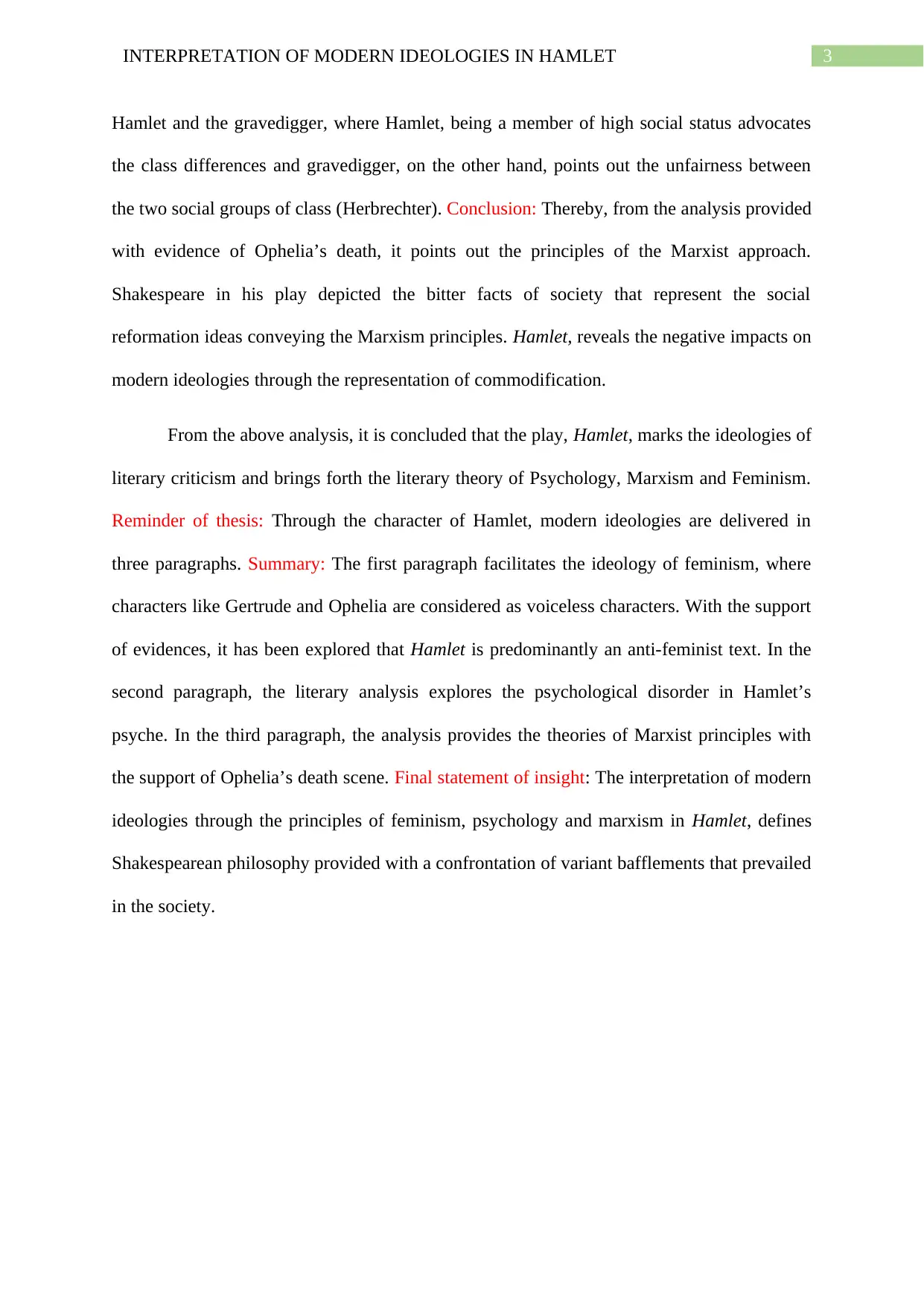
3INTERPRETATION OF MODERN IDEOLOGIES IN HAMLET
Hamlet and the gravedigger, where Hamlet, being a member of high social status advocates
the class differences and gravedigger, on the other hand, points out the unfairness between
the two social groups of class (Herbrechter). Conclusion: Thereby, from the analysis provided
with evidence of Ophelia’s death, it points out the principles of the Marxist approach.
Shakespeare in his play depicted the bitter facts of society that represent the social
reformation ideas conveying the Marxism principles. Hamlet, reveals the negative impacts on
modern ideologies through the representation of commodification.
From the above analysis, it is concluded that the play, Hamlet, marks the ideologies of
literary criticism and brings forth the literary theory of Psychology, Marxism and Feminism.
Reminder of thesis: Through the character of Hamlet, modern ideologies are delivered in
three paragraphs. Summary: The first paragraph facilitates the ideology of feminism, where
characters like Gertrude and Ophelia are considered as voiceless characters. With the support
of evidences, it has been explored that Hamlet is predominantly an anti-feminist text. In the
second paragraph, the literary analysis explores the psychological disorder in Hamlet’s
psyche. In the third paragraph, the analysis provides the theories of Marxist principles with
the support of Ophelia’s death scene. Final statement of insight: The interpretation of modern
ideologies through the principles of feminism, psychology and marxism in Hamlet, defines
Shakespearean philosophy provided with a confrontation of variant bafflements that prevailed
in the society.
Hamlet and the gravedigger, where Hamlet, being a member of high social status advocates
the class differences and gravedigger, on the other hand, points out the unfairness between
the two social groups of class (Herbrechter). Conclusion: Thereby, from the analysis provided
with evidence of Ophelia’s death, it points out the principles of the Marxist approach.
Shakespeare in his play depicted the bitter facts of society that represent the social
reformation ideas conveying the Marxism principles. Hamlet, reveals the negative impacts on
modern ideologies through the representation of commodification.
From the above analysis, it is concluded that the play, Hamlet, marks the ideologies of
literary criticism and brings forth the literary theory of Psychology, Marxism and Feminism.
Reminder of thesis: Through the character of Hamlet, modern ideologies are delivered in
three paragraphs. Summary: The first paragraph facilitates the ideology of feminism, where
characters like Gertrude and Ophelia are considered as voiceless characters. With the support
of evidences, it has been explored that Hamlet is predominantly an anti-feminist text. In the
second paragraph, the literary analysis explores the psychological disorder in Hamlet’s
psyche. In the third paragraph, the analysis provides the theories of Marxist principles with
the support of Ophelia’s death scene. Final statement of insight: The interpretation of modern
ideologies through the principles of feminism, psychology and marxism in Hamlet, defines
Shakespearean philosophy provided with a confrontation of variant bafflements that prevailed
in the society.
Secure Best Marks with AI Grader
Need help grading? Try our AI Grader for instant feedback on your assignments.
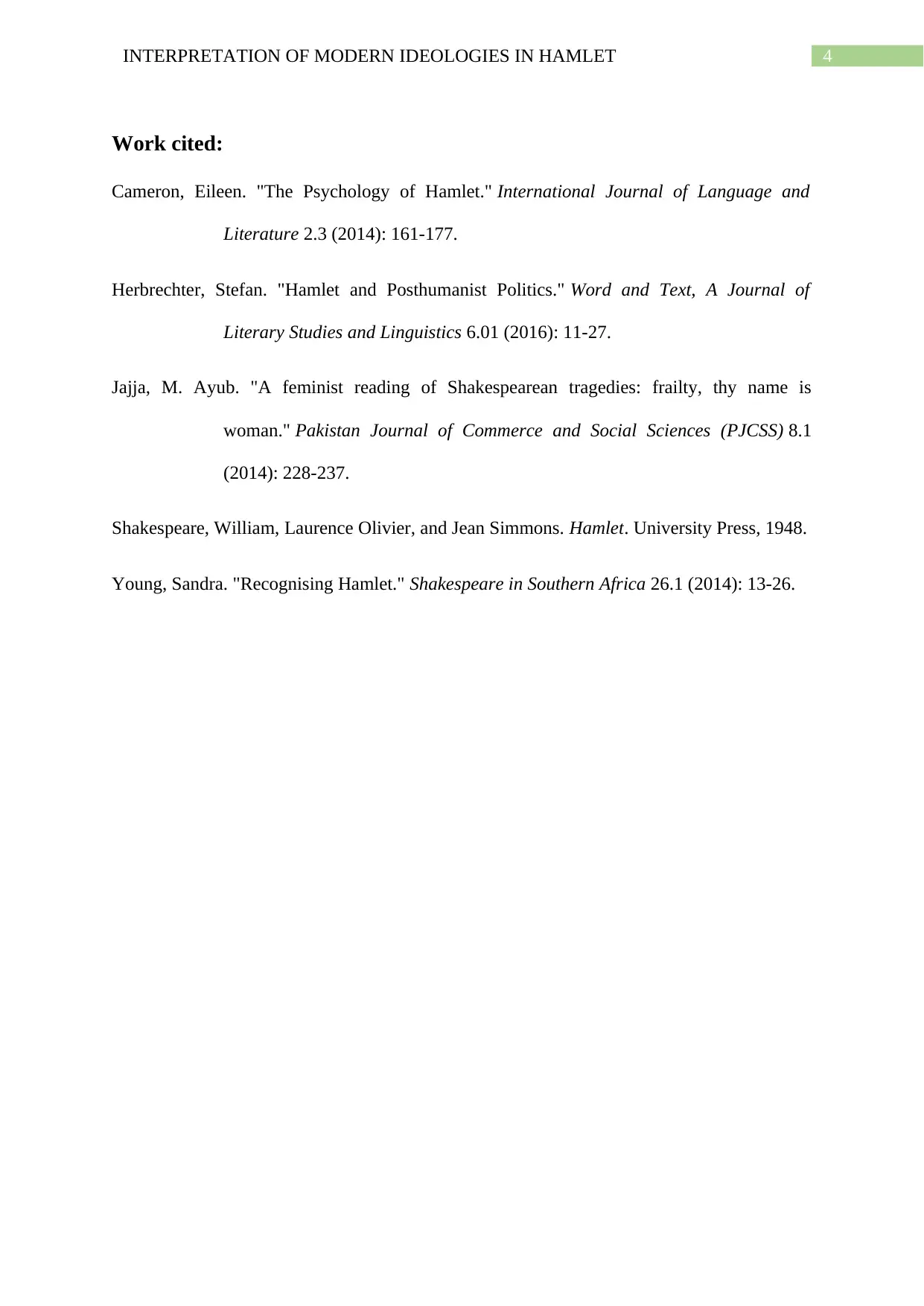
4INTERPRETATION OF MODERN IDEOLOGIES IN HAMLET
Work cited:
Cameron, Eileen. "The Psychology of Hamlet." International Journal of Language and
Literature 2.3 (2014): 161-177.
Herbrechter, Stefan. "Hamlet and Posthumanist Politics." Word and Text, A Journal of
Literary Studies and Linguistics 6.01 (2016): 11-27.
Jajja, M. Ayub. "A feminist reading of Shakespearean tragedies: frailty, thy name is
woman." Pakistan Journal of Commerce and Social Sciences (PJCSS) 8.1
(2014): 228-237.
Shakespeare, William, Laurence Olivier, and Jean Simmons. Hamlet. University Press, 1948.
Young, Sandra. "Recognising Hamlet." Shakespeare in Southern Africa 26.1 (2014): 13-26.
Work cited:
Cameron, Eileen. "The Psychology of Hamlet." International Journal of Language and
Literature 2.3 (2014): 161-177.
Herbrechter, Stefan. "Hamlet and Posthumanist Politics." Word and Text, A Journal of
Literary Studies and Linguistics 6.01 (2016): 11-27.
Jajja, M. Ayub. "A feminist reading of Shakespearean tragedies: frailty, thy name is
woman." Pakistan Journal of Commerce and Social Sciences (PJCSS) 8.1
(2014): 228-237.
Shakespeare, William, Laurence Olivier, and Jean Simmons. Hamlet. University Press, 1948.
Young, Sandra. "Recognising Hamlet." Shakespeare in Southern Africa 26.1 (2014): 13-26.
1 out of 5
Your All-in-One AI-Powered Toolkit for Academic Success.
+13062052269
info@desklib.com
Available 24*7 on WhatsApp / Email
![[object Object]](/_next/static/media/star-bottom.7253800d.svg)
Unlock your academic potential
© 2024 | Zucol Services PVT LTD | All rights reserved.
